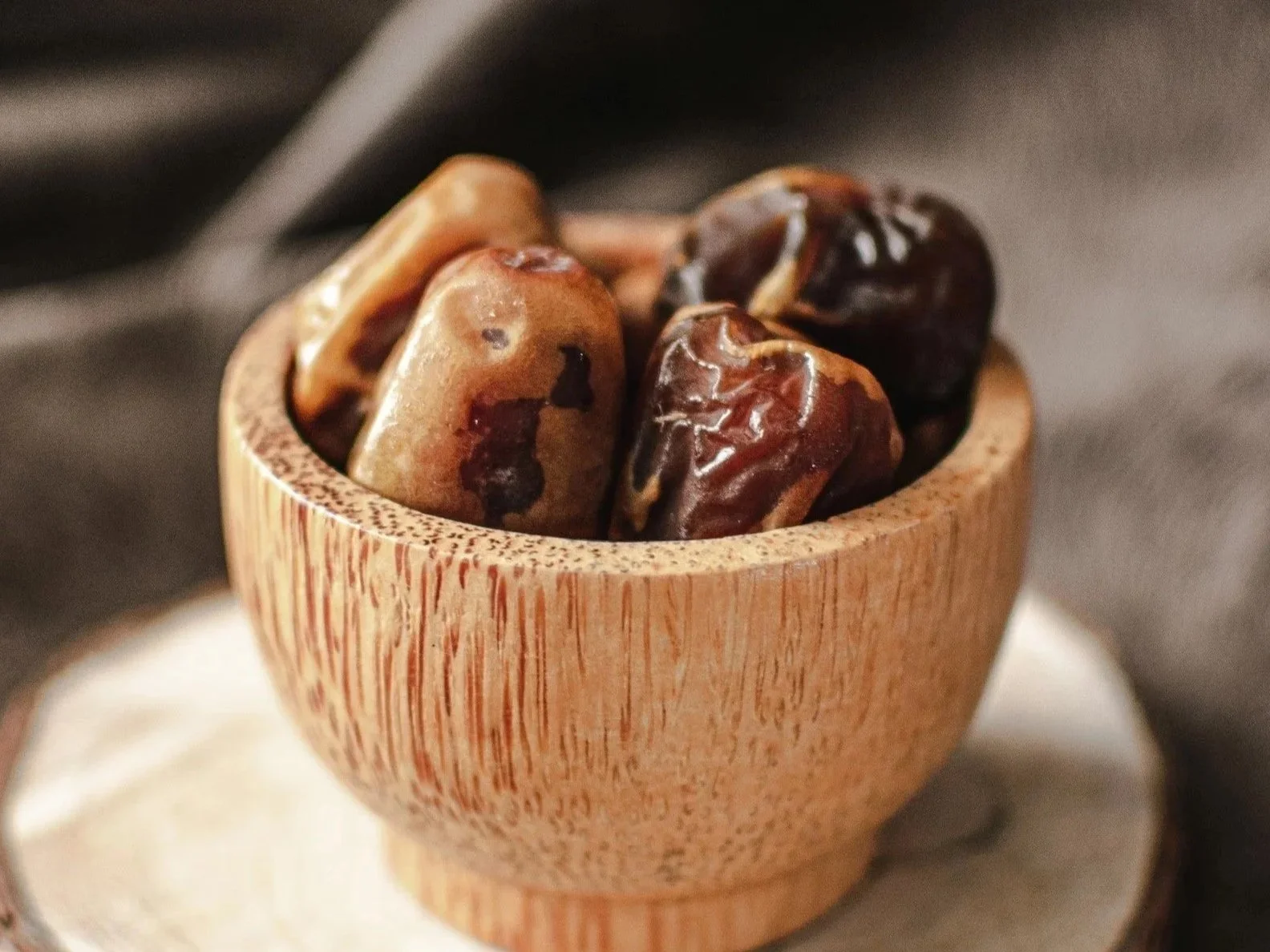Why date?
Scroll to the bottom for the recipe.
by Jill Aida Horn, MPH
Dates can help you thrive. Nope, I’m not talking about dates of the romantic kind, though those certainly can have incredible health benefits too (or sometimes opposite – we’ve all been there). But we’re talking about the sweet, brown, dry fruit that is a powerhouse of nutrients, fiber, and minerals. Dates are a great alternative to refined sugar when making healthier, homemade desserts, breakfast, or snacks. This article outlines a few reasons why we should be substituting dates for other sugars and how they work their wonders in our bodies and minds.
1. Dates contain healthy fiber and prebiotics.
Dates pack a decent amount of dietary fiber (about 6–8 g per 100 g), supporting healthy digestion and slowing sugar absorption into the bloodstream. Their soluble fibers actually act as prebiotics in the gut, nourishing beneficial bacteria that in turn produce health-boosting short- chain fatty acids and other secondary metabolites. Preclinical studies have shown that dates can promote the growth of beneficial gut bacteria such as Bifidobacteria and stimulate short-chain fatty acid production, which support gut health, immune regulation, and metabolic balance [1]. These findings are supported by clinical trials in humans, where regular date consumption was associated with favorable shifts in the gut microbiota and increased short-chain fatty acid output, reinforcing their role in digestive and metabolic health [2,3].
2. Dates are high in vitamins and polyphenols.
But dates aren’t just sugar and fiber—they’re a genuine, high-quality micronutrient source. They contain:
Vitamin B6 (pyridoxine): critical for neurotransmitter synthesis, brain health, and hormone regulation.
Niacin, riboflavin, and folate: supporting cellular energy metabolism.
Vitamin K: important for blood clotting and bone health.
Carotenoids and phenolic compounds: acting as natural antioxidants to reduce
oxidative stress and inflammation.
Their polyphenols (like flavonoids and phenolic acids) put them in line with other protective plant foods, helping to create a healthy gut microbiome, which in turn benefits immune function, mental health, and can help prevent chronic disease.
3. Dates contain meaningful amounts of healthy minerals.
Unlike refined sugar (virtually nutrient-free), dates provide potassium, magnesium, copper, and selenium in meaningful amounts per serving. Those minerals are important in fluid balance, nerve and muscle function, and antioxidant systems. Multiple analyses of date varieties consistently report robust potassium and magnesium, which are important minerals for optimal body function and hence an important dietary component [4].
4. Dates affect blood sugar less than other sugars.
Whole dates generally land in the low-to-medium glycemic index range, and their glycemic load per typical portion is modest—thanks in part to fiber and water. Clinical tests across many varieties show GI values most often in the 40s–50s (with some higher outliers), and GL values that remain in the low-to-moderate band for common serving sizes [5]. Translation: in reasonable portions, dates don’t spike glucose the way refined sugars can.
In comparison to other sugars, dates stand out as a blood sugar friendlier option. Though of course, they are still a simple sugar and should be consumed in moderation as a sweet treat! Global guidance and general rule of thumb when it comes to making healthier choices is to minimize free sugars (including honey and syrups) because, unlike intrinsic sugars locked in whole fruit, they are rapidly absorbed. Dates are a slightly less blood sugar disturbing option and hence are one of my favorite sources to add sweetness, moistness, and dewiness to desserts and snacks [6].
If you are going to take away just one thing, make it this: blending or chopping whole dates into desserts keeps the fruit’s fiber and phytochemicals in the recipe, which provides healthy vitamins and minerals, feeds the microbiome with fiber and prebiotics, and slows sugar absorption into the bloodstream. That’s why at Peak, we love dates and encourage you to ‘date yourself’ sometime this month and prepare a healthy sweet treat featuring our nutrition highlight of the week – dates! <3
Recipe of the Week:
Dark chocolate date cake (gluten-free, high-protein)
— deeply chocolatey, fudgy, and delicious.
Ingredients (serves about 12):
For the cake:
2 1⁄4 cups pitted dates (about 16 ounces / 450 g)
1⁄3 cup coconut oil or (vegan) butter
2 cups almond flour
1 teaspoon baking powder
1 tablespoon ground flaxseed
5 large eggs
5 ounces dark chocolate (at least 90% cacao), chopped
For the glaze:
1 bar dark chocolate (about 3.5 ounces / 100 g)
1⁄4 cup coconut oil or (vegan) butter
Instructions:
Preheat oven to 350°F. Grease or line a baking pan with parchment paper.
Place the dates in a saucepan, cover with water, and bring to a boil. Cook for 5–7 minutes
until very soft. Drain and mash with a fork until smooth.
In a large mixing bowl, whisk together the almond flour, flaxseed, and baking powder.
Add the eggs and stir until combined.
Add the mashed dates to the bowl and mix well.
In a small saucepan over medium heat, melt the coconut oil (or butter) with the chopped
dark chocolate, stirring until smooth. Add to the batter and stir until fully combined.
Pour the batter into the prepared baking pan and spread evenly. Bake for 35–45 minutes, or until the center is set and a toothpick inserted in the middle comes out clean.
While the cake is cooling, make the glaze: gently melt the dark chocolate bar with 1⁄4 cup
coconut oil (or butter) over low heat, stirring until smooth.
Once the cake has cooled slightly, pour the glaze evenly over the top. Refrigerate until
the glaze is firm, then slice and serve.
This article was constructed based on peer-reviewed, scientific literature. References used:
Costabile A, et al. (2014). Dates and the promotion of beneficial gut microbiota: a prebiotic potential. British Journal of Nutrition, 111(6): 1040–1048.
Eid N, et al. (2015). Impact of date fruit consumption on gut microbiota and short-chain fatty acid production: a randomized controlled trial. British Journal of Nutrition, 114(8): 1226–1236.
Ali A, et al. (2020). Effects of date consumption on gut microbiota, SCFAs, and markers of health: a human intervention study. Nutrients, 12(8): 2172.
Al-Farsi M, et al. (2005). Nutritional and mineral content of different varieties of dates. Journal of Food, Agriculture & Environment, 3(2): 1–6.
Miller CJ, et al. (2002). The glycemic index of dates and their potential in the diabetic diet. Diabetes Care, 25(9): 1485–1487.
Foster-Powell K, Holt SHA, Brand-Miller JC. (2002). International table of glycemic index and glycemic load values. American Journal of Clinical Nutrition, 76(1): 5–56.


